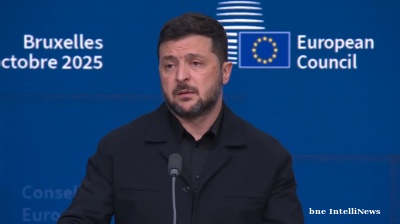The European Bank for Reconstruction and Development (EBRD) and the Ukrainian authorities on May 11 and 12 signed new agreements to support Ukraine’s power sector and help ensure food security following Russia’s invasion.
On May 11, the EBRD and the authorities in Kyiv agreed to repurpose part of an existing loan to electricity transmission company Ukrenergo to provide €50mn of emergency liquidity.
The European Union’s European Fund for Sustainable Development (EFSD) is providing a first loss guarantee to partially mitigate the risk of non-repayment for the EBRD.
“This EBRD support to the Ukrainian electricity company is vital to help maintaining everyday access to vital services for citizens. It is more important than ever to keep the real economy working,” said EBRD President Odile Renaud-Basso at the signing ceremony on the second day of the EBRD annual meeting in Marrakech.
“While Russia continues to wage its illegal war against Ukraine, it is more important than ever that we help keep Ukraine’s economy working as smoothly as possible. This is not easy under circumstances but we do what we can,” said European Commission Executive Vice-President Valdis Dombrovskis at the signing ceremony.
“Ukraine’s long-suffering people are already suffering hard enough just to survive Russia’s relentless bombardments. Keeping the power supplies running is a basic necessity, so I’m happy to sign this agreement on behalf of the EU to provide guarantee coverage for the EBRD for the state electricity company Ukrenergy.”
Dombrovskis added that the European Commission is working with the EBRD on additional support and plans to help address the liquidity needs of Ukraine’s railway and pharmaceutical sectors.
“Both the European Union and EBRD continue to stand fully by Ukraine and its people, and to do whatever it takes to keep its economy functioning in this brutal war,” he said.
The new agreement was signed after the EBRD agreed to lend €149mn to Ukrenergo in July 2019 to upgrade transmission infrastructure required to maintain system stability and back-up synchronisation with European electricity networks, and to help align Ukraine’s legal framework and operational practices with the EU Third Energy Package.
However, the loan has not yet been disbursed, and following Russia’s invasion Ukrenergo asked for it to be repurposed to meet its urgent liquidity needs. The company has seen its revenues slump since the start of the war.
According to Renaud-Basso, the company needs to enable the stable functioning of the Ukrainian electricity grid and the country’s nuclear generators, and ensure power continues to be delivered to both industries and households.
On May 12 the EBRD announced it is boosting food security in Ukraine by issuing risk-sharing instruments to selected local banks and a leasing company to back more than half the credit risk of newly originated financing provided by them up to a total value of €53.25mn. The share of risk the EBRD takes on with ProCredit Bank, OTP Bank Ukraine and OTP Leasing comes to €30mn, the development bank said.
The EBRD is sharing 60% of risk on up to €8.75mn of loans to be made by OTP Bank Ukraine, and 50% of risk on €19.5mn for OTP Leasing, as well as sharing 60% of risk on up to €25mn of loans to be made by ProCredit.
“Boosting food security during the war is a key element of the bank’s five-pronged support plan for Ukraine’s real economy,” the EBRD said on May 12.
“The EBRD’s dedicated food security package envisages supporting €200mn of food security investment this year in Ukraine … Aside from direct war damage, agricultural production is hampered by lack of fuel, access to seeds, fertiliser and equipment. Limitations on ships in the Black Sea add longer-term logistical risks,” the bank’s statement said.
News
Category 5 hurricane Melissa bears down on Jamaica with Haiti and Cuba in storm's path
A catastrophic Category 5 hurricane was bearing down on Jamaica on Monday, October 27 afternoon with sustained winds of up to 282kph (175mph), threatening to become the strongest storm the Caribbean island has ever experienced.
.jpg)
US senator tells Maduro "head to Russia or China" as warships close in on Venezuela
A senior US Republican senator has warned that Venezuelan President Nicolás Maduro's time in power is running out and suggested he leave the country, as military tensions in the Caribbean continue to escalate.

Milei celebrates resounding victory in Argentina's midterm elections
Argentine President Javier Milei scored a major win for his La Libertad Avanza (LLA) party in Argentina's October 26 midterm legislative elections, as the party obtained approximately 40.84% of the nationwide vote with 99.14% of the votes counted.

Zelenskiy accuses China of aiding Russia’s war effort through industrial and military support
Ukrainian President Volodymyr Zelenskiy accused China of materially supporting Russia’s military-industrial complex, providing key technologies and resources that have enabled Moscow to sustain and scale its war effort against Ukraine.

